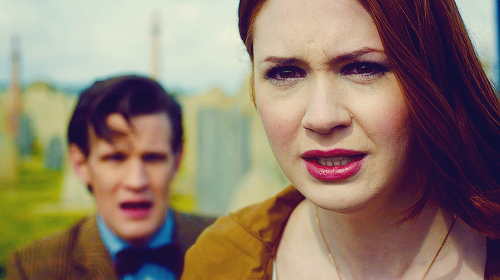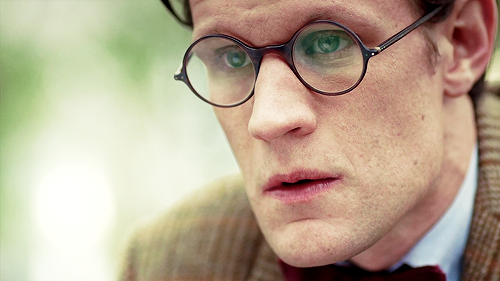Maybe it was a bad idea to watch Doctor Who on the same day as going to see Looper, because Looper was so goddamn amazing that most other time-travel stories pale in comparison. But Looper issues aside, this episode still wasn't terribly impressive. I avoid Doctor Who spoilers as much as humanly possible, but if you live in the UK it's very difficult to ignore widely-reported information such as the departure of the Ponds. All the coverage seemed to focus on "This episode is a real tearjerker!!" which annoyed me because a) you're not my dad, Steven Moffat, don't tell me what to do, and b) show don't tell, for god's sake! Surely it's enough that most viewers already knew that this would be the Ponds' final episode -- why bother hammering home all the stuff about how upsetting it's going to be? Let the story tell itself.
The end result was one of those TV moments that made me feel like a sociopath -- ie, a screen full of people crying hysterically to an overwrought orchestral soundtrack while I sat there, utterly unmoved. I find it increasingly disappointing that while Moffat's episodes were some of the very best in previous seasons, now that he's the showrunner I find myself practically groaning out loud when his name comes up on the credits. Of the five episodes we've had this season, the two that were written by Moffat have been laden with speedy emotional conflict/resolution subplots and the kind of sudden U-turn revelations that are beginning to remind me of M Night Shyamalan.
In theory, I was an ideal audience for The Angels Take Manhattan. I love Amy, I love the Eleventh Doctor, and I'm invested in the Amy/Rory relationship. I should have been weeping along with Matt Smith in the final scenes, but instead I found it to be rather anti-climatic. A lot of this was, I think, down to pacing, since the entire story had to unfold in a single episode and the latter half seemed very rushed. The rooftop scene was a particular problem for me because it took place so soon after the Doctor's uncharacteristically pessimistic revelation that Rory would "have to" live out the next 50 years in the Angel hotel. Plus there was the added distraction of the Statue of Liberty, which I have no doubt will be a bugbear for New Yorkers because when is there ever a time when no one is looking at the Statue of Liberty? Even if there was some moment when no one was looking at her, people would definitely stop and take notice when she began stomping across the city.
I wouldn't give the episode a wholly bad review. Even if I did find the supposedly tragic tearjerker scenes to be rather forced, the facts of the Amy/Rory epilogue were satisfyingly final. What interested me more was the Doctor's increasing neediness, with him noticeably freaking out over Amy getting older. I really enjoy the way the Doctor has come to value Amy and Rory as a unit without undercutting Rory's importance, even though the Doctor clearly has a far closer relationship with Amy than with Rory. Actually, I've come to think that the foreshadowing towards this episode's emotional arc was better than the episode itself, because the sense of foreboding had been ramped up so much that it couldn't really be resolved in one single episode. Even without the knowledge that this would be Amy and Rory's final adventure, the emotional focus of this season has been Amy and Rory getting older and growing away from the Doctor, and the Doctor trying to grab some time with them while he still can.
 The slow-breakup story was engaging and well-timed but the ultimate breakup itself seemed weak and rushed, which to me is emblematic of Steven Moffat's main flaw as showrunner. With no one to rein him in, he tends to write stories that put huge weight and significance on the run-up but then fail to live up to expectations when it comes to the payoff. Season 6 was the most glaring example of this because the first couple of episodes were so fascinating and exciting that I didn't realise until the finale itself that Moffat had written himself into a corner and the show had been going downhill all season. I'm hoping that the truncated nature of the next companion's half-season run will avoid this kind of thing happening to her -- at least, not at first.
The slow-breakup story was engaging and well-timed but the ultimate breakup itself seemed weak and rushed, which to me is emblematic of Steven Moffat's main flaw as showrunner. With no one to rein him in, he tends to write stories that put huge weight and significance on the run-up but then fail to live up to expectations when it comes to the payoff. Season 6 was the most glaring example of this because the first couple of episodes were so fascinating and exciting that I didn't realise until the finale itself that Moffat had written himself into a corner and the show had been going downhill all season. I'm hoping that the truncated nature of the next companion's half-season run will avoid this kind of thing happening to her -- at least, not at first. My feelings on River are very mixed, because while some of her appearances are entertaining, an equal number seem forced and random. She's an archetypal Awesome Side-Character, like Spike in the early seasons of Buffy, and Jack Harkness in season one of Doctor Who. Like the Weeping Angels, River is intriguing in moderation, but the more she appears the more irritating she becomes. The problem is that if you want to turn an Awesome Side-Character into a regular, you need to give them some flaws or else they just seem too larger-than-life, which is extra problematic in DW because the Doctor is already such a huge personality. This makes me irritated at myself because I really want to love a badass lady space-archaeologist, but the nature of River's role so far has been so one-note that I still don't view her as a fully-realised adult character. In this particular episode I rather liked her, which is just as well because the other Moffat favourite -- the Angels -- are reaching saturation point. The concept of the hotel/farm was scary, but the Angels themselves are a true horror-movie monster in the sense that their power lies in the fact that the audience can imagine their existence in real life. The whole idea of statues moving while you're not looking is a perfect horror-story, but the more they appear onscreen (particularly in that earlier episode where we actually saw them move, which I hated), the less frightening they become.
Tangentially related to River, there's one ongoing characterisation detail for the Doctor that I found particularly noticeable in this episode. It's never 100% clear just what goes on within the Doctor/River relationship, but I'm pretty sure that the Eleventh Doctor is supposed to be sexual in a way that Nine and Ten really weren't, as indicated by the way River flirts with him and the Doctor's reaction to that as the series progresses. But in complete opposition to that characterisation, he seems utterly baffled when it comes to other people in sexual/romantic relationships, particularly Amy and Rory. There are tons of little moments where he reacts to Amy and Rory's relationship with blank incomprehension (Why don't they want to sleep in bunkbeds? Bunkbeds are cool!) or a kind of comedic, childlike disgust (ie, he gets grossed out by them kissing), whereas any problems the Ninth or Tenth Doctors had with their companions' boyfriends were more to do with jealousy. I guess this characterisation may tie in with Eleven's strange mixture of childish and grandfatherly traits, but I still find it confusing.
Looking toward the Christmas episode, well... you know as much as I. The one comment I do have is that I wish the new companion wasn't being introduced this way, because Christmas episodes are by nature so different from a typical week's Doctor Who. Christmas episodes tend to be rather hackneyed because there's a built-in audience of drunk-on-Christmas-spirit adults and small children to entertain, and the story kind of has to fit in with various sentimental Christmas-story cliches. I suspect that the new companion may end up getting a negative reception from adult Whovians for this reason, which is unfortunate because it's already difficult to get audiences to like a new companion right off the bat.
(P.S. Am I the only one who found themselves singing the episode title to the tune of "First They Take Manhattan" by Leonard Cohen? No? Anyone?)
Previous reviews can be found on the Doctor Who tag.






















0 comments:
Post a Comment